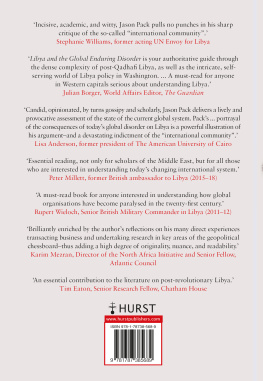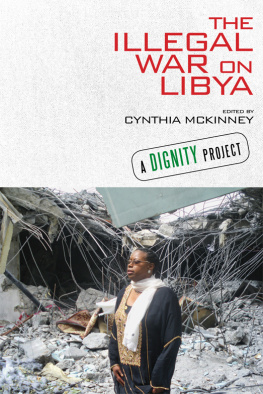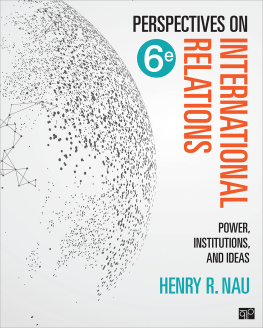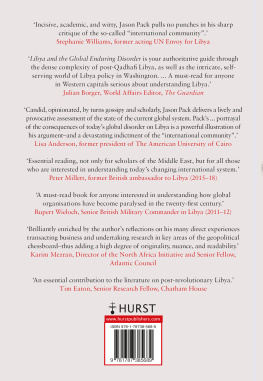Table of Contents

Incisive, academic, and witty, Jason Pack pulls no punches in his sharp critique of the so-called international community. He demonstrates how, together with their Libyan allies, international actors perpetuated and, in some cases profited from, Libyas descent into chaos. Libya and the Global Enduring Disorder is a timely reminder of how aspects of todays era of global disorder exacerbate governmental dysfunction, encourage rampant corruption, and provide impunity for human rights abusers. In addition to accurately diagnosing Libyas problems, Pack provides some good recommendations on the way forward, particularly with regard to measures to improve the performance and transparency of Libyas economic and financial institutions.
Stephanie Williams, Former Acting UN Envoy for Libya
Libya and the Global Enduring Disorder is your authoritative guide through the dense complexity of post-Qadhafi Libya as well as the intricate, self-serving world of Libya policy in Washington. Harnessing his extensive business experience, deep historical knowledge, and personal familiarity with the protagonists inside and outside Libya, Jason Pack tells his story with flair, erudition, and occasional humour. His book is a must-read for anyone in western capitals serious about understanding Libya.
Julian Borger, World Affairs Editor, The Guardian
Candid, opinionated, by turns gossipy and scholarly, Jason Pack delivers a lively and provocative assessment of the state of the current global system through the lens of his deeply informed and instructive appraisal of post-Qadhafi Libya. Packs acerbic assessment of the international system is not for the faint of heart. His portrayal of the consequences of todays global disorder on Libya is a powerful illustration of his argumentand a devastating indictment of the international community.
Lisa Anderson, Past President American University of Cairo
Libya and the Global Enduring Disorder employs a novel method in its investigation of recent events in Libya, examining the circumstances that drove the countrys conflicts and crises in order to illustrate the broader breakdown in the international system. Jason Pack explains recent trends in international politicsincluding the lack of US leadership, divisions in Europe and heightened competition between regional powers. He illustrates that the failure of international collective action towards Libya is an excellent model for demonstrating the importance of reforming the United Nations and multilateral institutions more broadly. The book is essential reading, not only for scholars of the Middle East, but for all those who are interested in understanding todays changing international system.
Peter Millett, former British ambassador to Libya (20152018)
With his riveting new book, Libya and the Global Enduring Disor-der, Jason Pack has strengthened his reputation as a leading writer on modern Libya. This revelatory work explodes some of the harmful myths about this poorly misunderstood Mediterranean country and its people. His exploration of the Enduring Disorder impact on post-Qadhafi Libya and the true motives of those who are profiteering from the lack of coherent international collective action may make uncomfortable reading for those who worked to liberate Libya in 2011. However, his penetrating analysisbased on meticulous research and personal experiencealso provides a practical way forward to reintegrate Libya into the international community. This is a must-read book for anyone interested in understanding how global organizations have become paralysed in the 21st century.
Rupert Wieloch, Senior British Military Commander in Libya
(2011 and 2012)
Libya and the Global Enduring Disorder draws upon Jason Packs deep knowledge of Libyas history and his personal participation in the countrys contemporary politics to introduce a new paradigm to the broader field of international relations theory. He uses the Libyan microcosm to shed light on the main geopolitical dynamics in action in the contem-porary world. The books narration is brilliantly enriched by the authors reflections on his many direct experiences transacting business and undertaking research in key areas of the geopolitical chessboardthus adding a high degree of originality, nuance, and readability.
Karim Mezran, Director of the North Africa Initiative and Senior Fellow,
The Atlantic Council
In Libya and the Global Enduring Disorder, Jason Pack makes an essential contribution to the literature on post-revolutionary Libya by diagnosing the underlying economic roots of the countrys ongoing conflict. Packs innovative assessments demonstrate how the institutions created in the Qadhafi era have acquired semi-sovereignty since 2011, dispelling the myth that modern Libya does not have institutions. He argues instead that it has the wrong ones, and that the current set of institutions are at the heart of Libyas problems.
Tim Eaton, Senior Research Fellow, Chatham House
LIBYA AND THE GLOBAL ENDURING DISORDER
JASON PACK
Libya and the
Global Enduring Disorder

HURST & COMPANY, LONDON
First published in the United Kingdom in 2021 by
C. Hurst & Co. (Publishers) Ltd.,
New Wing, Somerset House, Strand, London, WC2R 1LA
Jason Pack, 2021
All rights reserved.
Printed in Scotland
The right of Jason Pack to be identified as the author of this publication is asserted by him in accordance with the Copyright, Designs and Patents Act, 1988.
A Cataloguing-in-Publication data record for this book is available from the British Library.
ISBN: 9781787385689
This book is printed using paper from registered sustainable and managed sources.
www.hurstpublishers.com
For Polybius, the first historian of the Global System, who more than twenty-one centuries ago wrote:
Now up to this time the worlds history had been, so to speak, a series of disconnected transactions, as widely separated in their origin and results as in their localities. But from this time forth History becomes a connected whole: the affairs of Italy and Libya are involved with those of Asia and Greece, and the tendency of all is to unity.
Book 1, , Polybius of Megalopolis (200BCc. 118BC),
The Histories, 1889 Translation of Evelyn Shuckburgh
Just as Fortune made almost all the affairs of the world incline in one direction, and forced them to converge upon one and the same point; so, it is my task as an historian to put before my readers a compendious view of the part played by Fortune in bringing about the general catastrophe I thought it, therefore, distinctly my duty neither to pass by myself, nor allow anyone else to pass by, without full study, a characteristic specimen of the dealings of Fortune at once brilliant and instructive in the highest degree. It is only by the combination and comparison of the separate parts of the whole that a man can obtain a view at once clear and complete; and thus secure both the profit and the delight of History.
Book 1, , Polybius, The Histories, Shuckburgh translation
CONTENTS
ABOUT THE AUTHOR
Born in 1980 in Manhattan and raised in New Jersey, Jason majored in Biology at Williams College. The shocking events of 11 September 2001 changed his life. Shortly thereafter, he abandoned his senior thesis involving implanting mice with blood pressure measuring telemeters, deciding instead to grow a beard and move to Beirut. Little did he know that nearly all Lebanese university students are clean shaven. He went on to study in Morocco, Jordan, and Egypt. In Autumn 2003, when he was ready to take the next leap forward with his Arabic, his parents forbade him from travelling to Yemen. He responded by going to Baghdad and Karbala.














